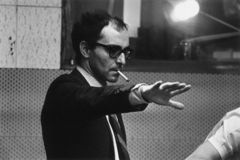
GODARD FOREVER PART2
The massive second half of our Godard retrospective traces the French New Wave master's journey from the political turmoil of May '68 to this year's elegiac Adieu au language.
Warning: His second half is to so narrative based and might be a burden to comprehend, though many will argue that one needs to work ones pleasures. But the Master is working at his eccentric peak, so it will not be empty viewings.
PASSION (Switzerland/France 1980) ***
Directed by Jean-Luc Godard
PASSION begins with a trail made in the sky by a plane followed by a woman in a factory pushing a cart on a trailer followed by a girl on a bicycle holding on a car door and trailing it. Godard plays parallel images while telling simultaneous stories, woman about to be laid of at work (Isabelle Huppert), unsympathetic boss (Michel Piccoli), tried relationships, filmmaker running into financial difficulties for directing a film on painting by Goya without a story and so on. Not all these make sense in the entire picture - but this is Godard, full of teasing and playfulness. PASSION contains the making of the film of the same name. The lighting is never ok; the budget is way over; the girl is too beautiful for the scene and the director, Jerzy (who looks like Godard with his glasses) who has lost focus in making his film says its hard making a film that shows nothing. Godard also provides his thoughts on dialogue which may be deemed a prologue to his latest film ADIEU AU LANGUAGE.
PRENON CARMEN (France/ 1983) ***
Directed b jean-Lu Godard
This is typical Godard. Multiple stories are loosely intercut into a single film with no clear narrative. Lots of Godard’s musings are interspersed with the proceedings (sayings like: If money is worth shit, then the poor will have no assholes) with anything happening according to the world of Godard. This time around, the Godard like director (there is often one in a Godard film), Uncle Jeannot is played by Godard himself. He sleeps in a hospital hoping to keeping staying there free by having a temperature which he thinks he can get by putting his fingers up the nurses’ ass. But the main protagonist is Carmen X (Maruschka Detmers), a female member of a terrorist gang. She asks her Uncle Jeannot, the washed-up film director if she can borrow his beachside house to make a film with some friends, but they are in fact planning to rob a bank. During the robbery she falls in love with a security guard, Joseph (Josep Bonaffe), begging a love/hate relationship. The film intercuts between Carmen's escape with the guard, her uncle's attempt to make a comeback film, and a string quartet attempting to perform Beethoven. All the nonsensical action culminate in a shoot out at a posh hotel. Very amusing or annoying, depending on whether one likes Godard or not, but the film did win the Golden Lion at the 1983 Venice Film Festival.
SAUVE QUI PEUT (LA VIE) (EVERYMAN FOR HIMSELF) (SLOW MOTION)
France/Germany/Austria/Switzerland 1979) *** Directed by Jean-Luc Godard
Godard’s first second film, as stated by the director himself, whatever that means. Godard is a complicated filmmaker and it is difficult attires to know what he is trying to say. It does not tell that he doesn’t care what people think. The three lead characters are Isabelle, a prostitute (Isabelle Huppert), Denise (Nathalie Baye) and Paul Godard (Jacques Dutronic). The film charts the different combinations of the three. Co-written by Godard with the Paul character an extension of himself, it is a beautifully shot film though one should not expect a story in a Godard film. he one scene involving Isabelle working as a prostitute deserves mention. It works lie a option picture put together, analyzing each movement, then adding components, then sound and then putting it all together. Godard uses different filming techniques like slow motion, jump edits, freeze frames to accentuate different parts of the story. Baye is wonderful winning the Best Supporting Cesar for her role in this film.
SYMPATHY FOR THE DEVIL (France 1968) **
Directed by Jean-Luc Godard
The title of the film is also the piece the Rolling Stones are recording in a London sound studio. Godard travelled to London after May 1968’s protests in Paris to film the Stones. So one an naturally expect the controversial vociferous director to put his mark on this then new film. He intercuts the film’s recording of the Stones with a scene involving a camera crew following a woman about, played by Anne Wiazemsky in a yellow peasant dress, in an outdoor wildlife setting, and no matter what she's asked, always answers "yes" or "no". As can be seen from the chapter heading to the scene, she is supposed to be a personification of democracy, a woman named Eve Democracy. Interwoven through the movie too, are outdoor shots of Black Panthers milling about in a junkyard littered with the rusting cars heaped upon each other. They read from revolutionary texts (including Amiri Baraka) and toss their rifles to each other, from man to man, as if in an assembly line, or readying for an impending battle. A group of white women, apparently kidnapped and dressed in white, are brutalized and ultimately shot, off-camera; their bloody bodies are subsequently seen in various tableaus throughout the film. If all these sound confounding, they are. And it can be very infuriating. So be forewarned! Rubbish or acceptance of Godard’s occasional incomprehensible musings - that is up to the viewer!
TOUT VA VIEN (France/Italy 1972) ***
Directed by Jean-Luc Godard and Jean-Pierre Gorin
TOUT VA BIEN (Everything is Fine) is one of the more accessible of Godard’s work in this series. It is also the most entertaining, funny and colourful. If you want to see a non confusing Godard film, this is it. The film centers on a strike at a meat factory which is witnessed by an American reporter (Jane Fonda) and her French husband (Yves Montand), who is a commercial director. There is always a film director in a Godard film, sort of representing the director himself. The film has a strong political message which outlines the logic of the class struggle in France in the wake of the May 1968 civil unrest. It also examines the social destruction caused by capitalism. The audience is always reminded that they are watching a movie. The performers like the director and the head of the workers union speak at length to the camera. The factory set consists of a cross-sectioned building (see film image above) and allows the camera to dolly back and forth from room to room, theoretically through the walls. Godard’s message is for once, clearly audible and understood by the audience.








Comments powered by CComment